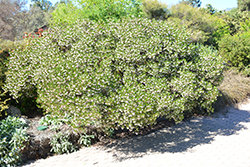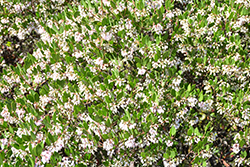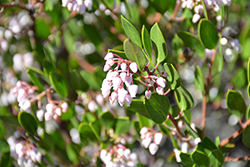It's all about ...
plants

White Lanterns Manzanita
Arctostaphylos 'White Lanterns'
Height: 10 feet
Spread: 10 feet
Sunlight:
![]()
![]()
Hardiness Zone: 8a
Description:
An attractive, densely leafed compact shrub covered with clusters of urn-shaped, white flowers in winter; blooms tint pink in cold weather; does not like alkaline soils; a coastal plant, protect from midday sun when planted inland; very drought tolerant
Ornamental Features
White Lanterns Manzanita is clothed in stunning nodding white bell-shaped flowers at the ends of the branches from mid to late winter. It has forest green evergreen foliage. The glossy oval leaves remain forest green throughout the winter. The peeling burgundy bark and brick red branches are extremely showy and add significant winter interest.
Landscape Attributes
White Lanterns Manzanita is a dense multi-stemmed evergreen shrub with an upright spreading habit of growth. Its average texture blends into the landscape, but can be balanced by one or two finer or coarser trees or shrubs for an effective composition.
This is a relatively low maintenance shrub, and should only be pruned after flowering to avoid removing any of the current season's flowers. It is a good choice for attracting birds, squirrels and hummingbirds to your yard. It has no significant negative characteristics.
White Lanterns Manzanita is recommended for the following landscape applications;
- Accent
- Mass Planting
- Naturalizing And Woodland Gardens
Planting & Growing
White Lanterns Manzanita will grow to be about 10 feet tall at maturity, with a spread of 10 feet. It has a low canopy with a typical clearance of 2 feet from the ground, and is suitable for planting under power lines. It grows at a slow rate, and under ideal conditions can be expected to live for approximately 30 years.
This shrub does best in full sun to partial shade. It is very adaptable to both dry and moist growing conditions, but will not tolerate any standing water. It is very fussy about its soil conditions and must have sandy, acidic soils to ensure success, and is subject to chlorosis (yellowing) of the foliage in alkaline soils, and is able to handle environmental salt. It is somewhat tolerant of urban pollution. This particular variety is an interspecific hybrid.
This plant is not reliably hardy in our region, and certain restrictions may apply; contact the store for more information.


